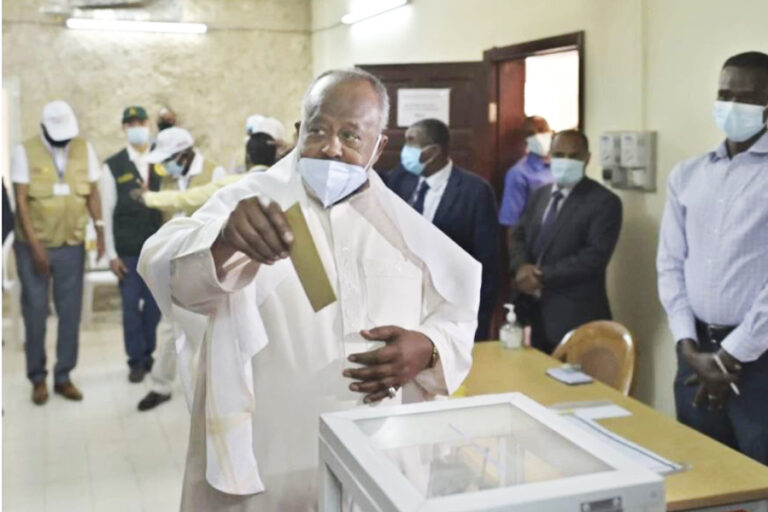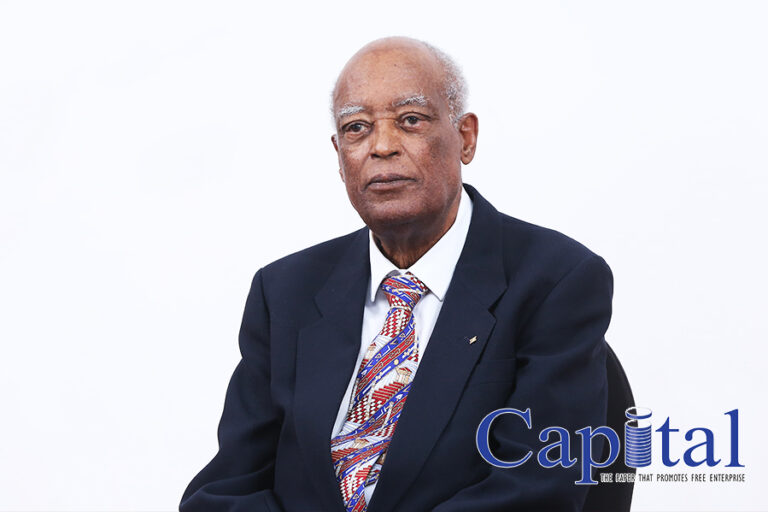Djibouti’s Ismail Omar Guelleh was re-elected for a fifth term as president with more than 98 percent of the vote, according to provisional results announced early on Saturday April 10.
About 215,000 citizens were registered to vote in the ballot pitting Ismail Omar Guelleh, 73, against a businessman and a political newcomer Zakaria Ismail Farah.
Counting started shortly after polling stations closed on Friday April 9, in the Horn of Africa nation, which overlooks one of the world’s busiest trade routes at the crossroads between Africa and the Arabian Peninsula.
“President Ismail Omar Guelleh obtained 167,535 votes, which is 98.58 percent,” Interior Minister Moumin Ahmed Cheick told public broadcaster RTD early on Saturday, adding that confirmed results would be released soon by the Constitutional Council.
Independent election observers said the process went smoothly, with no reports of misconduct.
In a social media post early on Saturday, Ismail Omar Guelleh wrote, “Thank you for your trust, thank you for Djibouti! Together, let’s continue!”
Earlier, after voting in the capital where most of Djibouti’s one million people reside, Guelleh praised the trouble-free conduct of the electoral exercise.
Dressed in immaculate white traditional robes, he said he was “very, very confident” of victory, after placing his vote in a transparent ballot box.
Zakaria Ismail Farah, a 56-year-old cleaning products importer, ended up with less than 5,000 votes, according to the provisional results.
Ahmed Tidiane Souare, the head of an African Union (AU) observer mission, said all candidates were free to send their officials to any polling station.
Zakaria Ismail Farah, who had styled himself as the “flag bearer of poor Djiboutians”, had alleged unfair treatment during the election campaign, including that he was not provided security at his rallies.
Ismail Omar Guelleh re-elected as Djibouti leader
The lord of the ring passed away
Known around the world as ‘Lord of the Ring’, for inventing laparoscopic adjustable gastric banding to treat morbid obesity professor and surgeon Mitiku Belachew has died at the age of 78 in Liege, Belgium on Thursday, April 8.
Born into a family of 9 in 1942, in a rural area where there were no schools, he tended to cows and goats from the time he was a small child. Then, when he turned 12 he heard about a school far away. He went there and made the most of the opportunity, graduating just 7 years later. This initiative and drive became a trademark of his life as he learned French to study at a Belgium university when there was not a medical school here and invented a way to save the lives of those who were grossly overweight.
Professor Mitiku was a surgeon of Ethiopian origin practicing obesity surgery since 1975. He was one of the pioneer surgeons for laparoscopic surgery. He developed the Laparoscopic Adjustable Gastric Banding (LAGB) technique for the treatment of morbid obesity. Since then, successful surgical workshops have been organized to which Prof. Mitiku had trained more than 300 surgeons from all over the world on this procedure. He also used to teach LAGB in many places around the World. He was proctoring FDA approved clinical trial programs of LAGB in more than 15 university centers in the USA since 1995.
then, successful surgical workshops have been organized to which Prof. Mitiku had trained more than 300 surgeons from all over the world on this procedure. He also used to teach LAGB in many places around the World. He was proctoring FDA approved clinical trial programs of LAGB in more than 15 university centers in the USA since 1995.
Professor Mitiku in the last few years wrote a book entitled ‘The Shepherd Became A Surgeon’ that was translated in Amharic and English from the original French version. The book focuses on the life history of the professor who managed to become a world renowned Doctor from being a shepherd in a small village.
The professor and surgeon, has lived a life that truly inspires each and every one of us to rise above our circumstances. Whenever there was an obstacle he overcame it.
He also brought tools and experience with him to Ethiopia in the last couple of years where he was working to train the next generation of doctors. Furthermore, he inspired others to say no to limitations and encouraged them to use their talents to enrich the lives of others.
His relentless desire to inspire others is what led to the translation of his book to Amharic and English from the original French version; so as to light the path of others with the much needed motivation and zeal during these times.
“The book is an autobiography. It mainly focuses on how I went from being a herder in a very small rural city to a surgical doctor travelling all over the world. It’s written in French but now it’s translated to English. It’s a popular book with French speaking people,” Mitiku once told Capital in an ever so jovial manner. “It is also translated in Amharic with a title ‘Eregnaw Hakim’. I hope it will reach more people and inspire and motivate them.”
Colonel Melese Tessema Korea war veteran passed away
Colonel Melese Tessema who was the president of the Ethiopian Korean War Veterans’ Association has died at the age of 90, on Friday April 9 2021.
Colonel Melese was a retired service man who fought in Korea shortly after graduating from the Ethiopian military academy in 1951. As a second lieutenant of the Imperial Ethiopian Army, he led a platoon in Korea for fifteen months. Upon return to his country, he led security forces until Haile Selassie left office. After that, he worked for welfare associations before becoming president of Korean War veterans. Although he had never heard of Korea before he left for the war, Melese Tessema went on to know far more about Korea and further had great love for its people.
Colonel Melese Tessema arrived in the first detachment on May 6 of 1951 in Korea when the city was in ruins. Orphaned children cried in the streets and poverty reigned all over. When he returned recently to see the country he fought for, he was surprised at the progress of modern South Korea.
Colonel Melese Tessema was a remarkable man and a transparent strong soldier. He acknowledged feeling afraid as he joined the fighting in the Korean War, but he asserted that soldiers cannot allow fear to interfere with a mission. He arrived in Kumhwa and fought the Chinese on Hill 358. He remained defiant even though Shrapnel from a mortar shell injured his leg during the fighting. Colonel Melese Tessema went on to receive a Korean, Ethiopian, and United States awards, including the United States bronze star.
Since his return from Korea, Colonel Melese Tessema has wished that Ethiopia could learn from the economic successes of South Korea as he longed for astronomical success for the country. May his wishes truly come to pass.
He was laid to rest at the Holy Trinity Cathedral on Saturday April 10.
Sub-Saharan Africa: The devastating impact of conflicts compounded by COVID-19
The COVID-19 pandemic has exposed the terrible legacy of deliberately divisive and destructive policies that have perpetuated inequality, discrimination, and oppression across Sub-Saharan Africa, Amnesty International said in its annual report published today.
Across the region, the devastating impact of armed conflict in countries such as Ethiopia, Mozambique, Cameroon, and Nigeria, was compounded by the pandemic as a number of states weaponized it to crack down on human rights. The crackdowns included killings of civilians and arrests of opposition politicians and supporters and human rights defenders and activists in countries such as Angola, Guinea, and Uganda.
Amnesty International Report 2020/21: The State of the World’s Human Rightscovers 149 countries – including 35 in Sub-Saharan Africa – and delivers a comprehensive analysis of human rights trends globally in 2020.
In it, the organization highlights conflicts between states and armed groups and attacks on civilians continuing or escalating in most parts of the region.
“Conflicts between states and armed groups and attacks on civilians have continued or escalated in most parts of Sub-Saharan Africa. In Southern Africa, the long simmering violent tensions in Mozambique’s Cabo Delgado province intensified into full-blown armed conflict. The Horn of Africa region saw an outbreak of conflict in Ethiopia’s Tigray region,” said Deprose Muchena, Amnesty International Director for East and Southern Africa.
“At the same time, armed groups maintained a foothold in West Africa and the Sahel region, attacking civilians in Burkina Faso, Mali, Niger, and Nigeria. They blighted many lives in Cameroon, the Central African Republic (CAR) and Chad. In response, state security forces also committed grave human rights violations against civilians,”
Pandemic has amplified decades of inequalities
The report also describes those already most marginalized, including women and refugees, as bearing the devastating brunt of the COVID-19 pandemic, as a result of discriminatory policy decisions by leaders in the region.
“COVID-19 has brutally exposed and deepened inequality across Sub-Saharan Africa. Governments should urgently re-invest in people and “repair” the broken economic and social system which perpetuates poverty and inequality, including leaving too many behind,” said Samira Daoud, Amnesty International West and Central Africa Director.
Amnesty’s report shows how existing inequalities have left marginalized communities, refugees, older people, health workers, and women disproportionately negatively affected by the pandemic, with gender-based violence exacerbating the situation.
COVID-19 worsened the already precarious situation of refugees, asylum seekers and migrants in many countries, trapping some in squalid camps, cutting off vital supplies, or precipitating border controls that left many stranded.
For example, Uganda, the largest refugee-hosting country in Africa with 1.4 million refugees, immediately closed its borders at the start of the pandemic and did not make an exception for refugees and asylum seekers trying to enter the country. As a result, over 10,000 people were stranded along its border with the Democratic Republic of Congo (DRC).
The report highlights a marked increase in gender-based and domestic violence with many women facing increased barriers to protection and support due to restrictions on freedom of movement.
For example, 21 women and children had been killed by intimate partners in South Africa by mid-June, while over 3,600 rapes were recorded during the COVID-19 lockdown in Nigeria. In CAR, the UN recorded 60 cases of conflict-related sexual violence, including rape, forced marriage, and sexual slavery, between June and October.
Health workers operated in insanitary and unsafe environments
Across the region, many working in the informal sector have been left without an income or social protections due to lockdowns and curfews. Health workers operated in insanitary and unsafe environments due to shortages of PPE and sanitizers.
For example, in South Africa, by early August, at least 240 health workers had died after contracting COVID-19. By July, about 2,065 health workers in Ghana had been infected and six had died due to COVID-19-related complications. Despite facing increased workloads and additional occupational risks, health workers in most countries remained without adequate compensation.
Weaponizing the pandemic to further assault human rights
The report also paints a dismal picture of countries where authorities continued to restrict liberties in their handling of the pandemic.
From Togo to Kenya and Angola to South Africa, the annual report highlights governments using excessive force to enforce compliance with COVID-19 response measures.
“In many countries, authorities violated freedom of expression and peaceful assembly to silence critical voices leading to large numbers of arbitrary detentions and killings of demonstrators,” said Samira Daoud.
Authorities using legislation criminalizing commentary related to the pandemic has been a presiding pattern. They used the COVID-19 pandemic as a pretext to continue suppressing the right to freedom of expression, including by prosecuting individuals, who posted comments on social media about government responses to the pandemic, for spreading “false news”.
Use of excessive force led to several cases of multiple killings, including while enforcing COVID-19 measures. In Nigeria, brutal policing has resulted in security forces killing people for protesting in the streets, demanding their rights, and calling for accountability. In Zimbabwe at least 10 people were killed, while thousands including protesters, were arbitrarily arrested and detained in the context of enforcing COVID-19 measures. In Guinea, seven people were killed during demonstrations against the security forces’ enforcement of COVID-19 movement restrictions.
Some leaders have gone a step further, using the distraction of the pandemic to clamp down on criticism – and critics – unrelated to the virus, and perpetrate other human rights violations. For example, in Tanzania, authorities further cracked down on civil society activists, including through restricting human rights such as freedom of expression, association and peaceful assembly ahead of the October election.
The crackdown on protests in Guinea resulted in the deaths of dozens of people, hundreds injured and more than 70 others arbitrary detained. In Niger, human rights defenders calling for anti-corruption protests were arbitrarily arrested.
Dozens of people were arbitrarily arrested in August in Côte d’Ivoire for having participated in demonstrations against President Ouattara’s running for a third term. A nationwide ban on demonstrations was issued in Cameroon after the opposition Cameroon Renaissance Movement (MRC) called for the resignation of the president and hundreds of demonstrators were arbitrarily arrested.
“Regional institutions have failed to make respect by States their founding principles on human rights protection. Some States like Benin and Cote d’Ivoire have contributed to the fragility of regional institutions like the African Court on Human and Peoples’ Rights by preventing individuals and NGOs direct access to the court,” said Deprose Muchena.
“The pandemic has cast a harsh light on the failure to cooperate effectively in times of dire global need. The only way out of this mess is through international cooperation. States must ensure vaccines are quickly available to everyone, everywhere, and free at the point of use. Pharmaceutical companies must share their knowledge and technology so no one is left behind. G20 members and international financial institutions must provide debt relief for the poorest 77 countries to respond and recover from pandemic.”
Failed by their governments, protest movements the world over have stood up
Regressive policies have inspired many people to join long-standing struggles as seen with #ZimbabweanLivesMatter, against constant human rights violations and the #End SARS protests in Nigeria as well as the #ShutItAllDown protests to spotlight gender-based violence in Namibia among others.
The report details many important victories that human rights activists helped to secure in 2020. These include new legislation to counter violence against women and girls in Sudan. In Sierra Leone, the government overturned a ban preventing pregnant girls from attending school and sitting exams, following years of campaigning by Amnesty and other partners.
“Leadership in 2020 came not from power or privilege. It came from the countless people marching to demand change. We saw an outpouring of support for #End SARS, #ZimbabweanLivesMatter as well as public protests against repression and inequality in places across the continent. Often risking their own safety, it was the leadership of ordinary people and human rights defenders the world over that urged us on. These are the people at the frontier of the struggle for a better, safer and more equal world,” said Samira Daoud.
“We are at a crossroads. We must release the shackles that degrade human dignity. We must reset and reboot to build a world grounded in equality, human rights, and humanity. We must learn from the pandemic and come together to work boldly and creatively so everyone is on an equal footing,” added Deprose Muchena.






